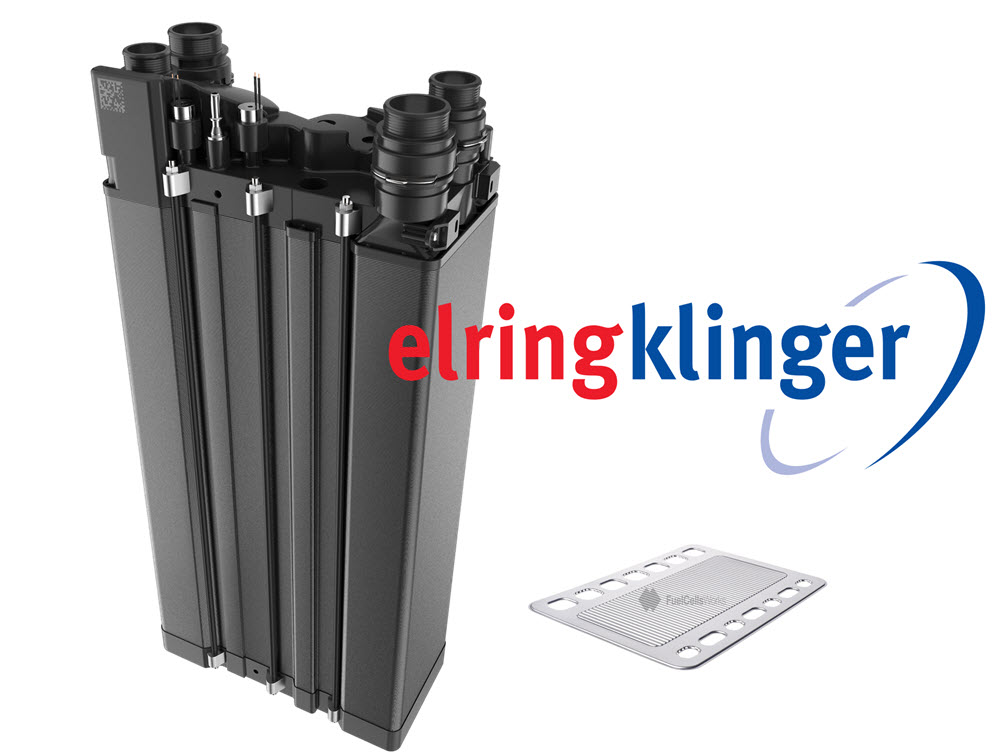
To underpin the revision required to the ISO standard for the quality of hydrogen dispensed at fueling stations, ElringKlinger will be supplying a total of 68 fuel cell short stacks by the end of 2022 to a research consortium made up of several leading institutes in Germany.
The stacks are to be used as part of a three-year research project at the ZSW’s testing facilities in Ulm.
The fuel cell will play a key role in the transformation of mobility. Estimates suggest that, by 2030, more than 5 million fuel cell vehicles around the globe will need filling with hydrogen. There are plans to build 400 hydrogen fueling stations by 2025 in Germany alone.
To deliver the underlying data on which to base a revision of the ISO standard governing the quality of the hydrogen dispensed at these stations, Duisburg-based Zentrum für BrennstoffzellenTechnik GmbH (ZBT) is coordinating the “H2Fuel” research project. This involves deploying fuel cell stacks at testing facilities run by the Center for Solar Energy and Hydrogen Research Baden-Württemberg (ZSW). As part of the project, which is funded by the German government via the National Organisation Hydrogen and Fuel Cell Technology (NOW), ZBT is partnering with the Fraunhofer Institute for Solar Energy Systems in Freiburg, the ZSW in Ulm, Ludwig-Bölkow-Systemtechnik GmbH in Ottobrunn, and the Institute for Physical Chemistry at Heinrich Heine University Düsseldorf. Mercedes-Benz FuelCell, Toyota, BMW, and Ford are also on board as associate partners.
To enable the project to come to fruition, ElringKlinger AG will be supplying a total of 68 fuel cell short stacks to the research consortium by the end of 2022. The stacks will be put through their paces at the ZSW’s testing facilities in Ulm over a three-year period. Short stacks have only a small number of cells, which are being designed to have a lower power output than usual for the purpose of the tests. The contract also covers membrane electrode assemblies (MEA), where the electrochemical reaction takes place. The first stacks will be delivered as early as the beginning of 2021.
Dr. Stefan Wolf, CEO of ElringKlinger AG, commented: “For us, the fact that ElringKlinger’s fuel cell stacks have been chosen to deliver the underlying scientific data that will inform everyday use is further proof of how pioneering our best-in-class technology really is. We’ll be delighted if our stacks help to gain valuable insights into hydrogen quality in fueling stations as part of this project.”
Over the course of the tests, the “H2Fuel” project is planning to expose the stacks to various stress situations relating to hydrogen use in order to establish new technically and economically appropriate limits for hydrogen quality. This is because the quality requirements that the hydrogen to be used has to meet will have a material impact on how much it will cost and how long the fuel cells will last. For this reason, the project is also aiming to quantify how contaminants in the hydrogen could potentially impact on the performance and service life of the MEA and to use this as a basis for determining requirements for hydrogen purity. Building on the research findings obtained from “H2Fuel,” the intention is for Germany’s network of hydrogen fueling stations to play a pioneering role in the application of sound, practicable standards.
Read the most up to date Fuel Cell and Hydrogen Industry news at FuelCellsWorks




